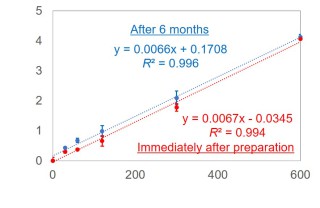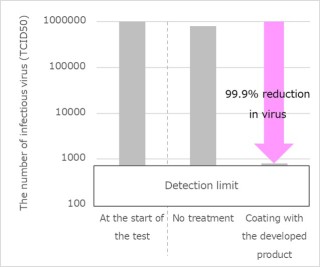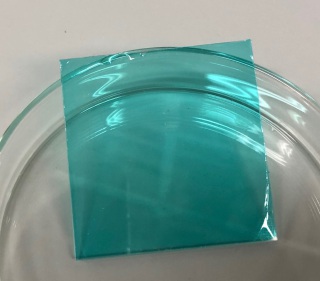Development of a Coating Material with High Antiviral Effect! – The Inactivation of Human Coronavirus through the New Coating Material –
- Research and Development
NIPPON SHOKUBAI CO., LTD. (Headquarters: Osaka, Japan, President: Yujiro Goto, hereinafter “Nippon Shokubai”), and a research group led by Professor Hiroshi Uyama at Division of Applied Chemistry, Graduate School of Engineering, Osaka University have jointly developed a coating material that is expected to add antibacterial and antiviral effects to the surfaces of various materials.
This coating material
■has the antibacterial and antiviral effects of phthalocyanine metal complex, and the adhesive function of cellulose acetate,
■inactivated more than 99.9% of a human coronavirus,
■is expected to be used for a wide range of applications that require hygiene measures, and
■was developed by Nippon Shokubai Research Alliance Laboratories established by us at Graduate School of Engineering, Osaka University in April 2017.
The newly developed coating material consists of a phthalocyanine metal complex (*1) and cellulose acetate, and exhibits the antibacterial and antiviral effects of the phthalocyanine metal complex and adhesion function of cellulose acetate to various materials.
In a comparative evaluation of existing photosensitizers (*2) with a focus on photosensitizers that generate singlet oxygen capable of inactivating various bacteria, fungi, and viruses, we found that the phthalocyanine metal complex was optimal in terms of singlet oxygen release capacity and stability. In addition, by optimizing the structure of phthalocyanine through full utilization of the design technology for infrared ray cut filter pigments, etc. that Nippon Shokubai accumulated in the past, we have developed a new phthalocyanine metal complex which is highly dispersible in cellulose acetate and which can produce singlet oxygen over a long period of time.
Cellulose acetate is a polymer that is obtained by modifying plant-derived cellulose with acetic acid, and can be used to form a cellulose acetate layer on the surfaces of various different materials such as glass and PTFE (polytetrafluoroethylene, which is a fluororesin) by coating the surface with its polymer solution and drying.
It was confirmed that more than 99.9% of the human coronavirus was inactivated when we evaluated the antiviral performance of PMMA (acrylic resin) plates coated with the developed product against a human coronavirus OC43 with the test method specified in ISO 21702 (*3).
Based on the above, the developed product is expected to be widely used as a coating material with antibacterial and antiviral effects for applications that require hygiene measures.
In the future, Nippon Shokubai Research Alliance Laboratories will continue to promote the creation of innovative technologies, the creation of new businesses, and the development of human resources for research by integrating the cutting-edge academic findings and information technology infrastructure of Graduate School of Engineering, Osaka University with the proprietary technologies of Nippon Shokubai including catalysts, organic synthesis, and polymer synthesis, and utilizing data science.
*1 Phthalocyanine is a cyclic compound with a structure in which the 4 phthalate imides are cross-linked by nitrogen atoms. The complex is made by complex formation between this and metal ions.
*2 A substance that helps the processes of reaction and light emission by transferring the energy it obtained by absorbing light to other substances.
*3 Entrusted to VisGene, Ltd.
This news release does not claim that the developed product is effective against all bacteria and viruses. In addition, it does not claim to be effective in the prevention or treatment of any disease.
About NIPPON SHOKUBAI Co., Ltd.: Since 1941, Nippon Shokubai has grown up its business with unique catalyst technology. Nippon Shokubai has supplied, for example, ethylene oxide, acrylic acid, automobile catalysts, process catalysts and so on. Among all, our global market share of superabsorbent polymers is the largest in the world now. Nippon Shokubai is a global chemical company operating under its corporate mission “TechnoAmenity-Providing affluence and comfort to people and society with our unique technology.”
【Contacts】
Corporate Communications Dept.,
NIPPON SHOKUBAI CO., LTD.
TEL: +81-3-3506-7605 E-mail: shokubai@n.shokubai.co.jp



[Files]